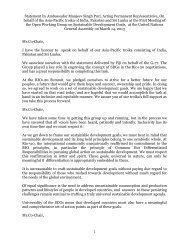STATE OF THE WORLD'S CITIES 2012/2013 Prosperity
STATE OF THE WORLD'S CITIES 2012/2013 Prosperity
STATE OF THE WORLD'S CITIES 2012/2013 Prosperity
Create successful ePaper yourself
Turn your PDF publications into a flip-book with our unique Google optimized e-Paper software.
State of the World’s Cities <strong>2012</strong>/<strong>2013</strong><br />
conditional on certain requirements such as school<br />
attendance, visits to clinics and periodic immunization. 12<br />
Brazil’s Bolsa Família scheme, which benefits 11.1 million<br />
families, is the largest of its kind in the world, and has<br />
contributed to reducing poverty and inequality. 13 Indeed,<br />
80 per cent of Bolsa Família benefits go to families living<br />
below the poverty line; the programme also accounted for<br />
21 per cent of the decline in<br />
inequality in Brazil between<br />
1995 and 200414 Policies that<br />
– all of<br />
FACT promote the<br />
which contribute to making<br />
participation of civil society cities more prosperous.<br />
are perceived as the fourth<br />
most important factor<br />
behind enhanced urban<br />
prosperity.<br />
POLICy<br />
Participation of<br />
civil society has<br />
the potential to empower<br />
communities, build social<br />
capital, lead to better design<br />
of urban projects, and<br />
allow for citizens’ concerns<br />
to be incorporated into<br />
development strategies.<br />
POLICy<br />
Lessons from<br />
experience<br />
suggest that successful<br />
civil society participation<br />
is dependent upon<br />
certain preconditions<br />
such as: (i) a political<br />
system that encourages<br />
active citizenship and is<br />
committed to equity and<br />
remedial action; (ii) the<br />
legal basis for participation;<br />
(iii) available resources<br />
in terms of skilled and<br />
committed professionals,<br />
as well as well-resourced<br />
and empowered local<br />
governments; and (iv)<br />
informed and organized<br />
communities and<br />
stakeholders. 16<br />
Civil society participation<br />
The perceived importance<br />
of participation of civil<br />
society varies across<br />
regions. It is seen by local<br />
experts as the second<br />
most important factor in<br />
Latin America and the<br />
Caribbean, while in Arab<br />
96<br />
States, it is the fifth important factor. This is not surprising,<br />
given that participation of civil society has very strong roots<br />
in Latin American cities, with the best-known participatory<br />
approaches being participatory budgeting and participatory<br />
planning. A classic example of participatory planning<br />
process in Asia is the People’s Campaign for Decentralized<br />
Planning in Kerala (India), which strengthens democratic<br />
decentralization by identifying local needs and establishing<br />
local development options and priorities through local<br />
consultation and participation. 15<br />
Elected local officials<br />
Research shows that durable democracy is correlated with<br />
economic development. 17 Across the world, the more<br />
prosperous cities (at least economically) tend to be located<br />
in countries that are stable democracies. Democratically<br />
elected local officials owe their mandate to the people, and<br />
as such, are best placed to respond to the people’s needs,<br />
which include providing good conditions for employment,<br />
Kerala, India: food security is critical for productivity. Ready<br />
access to a variety of wholesome food enhances quality of life.<br />
© <strong>2012</strong> Peter Herbert/fotoLIBRA.com



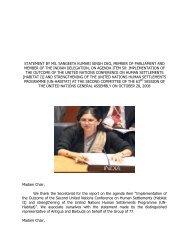
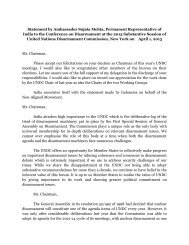

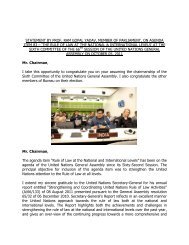

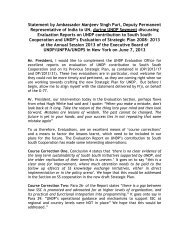
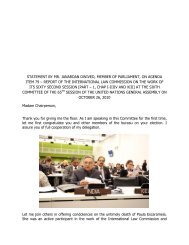

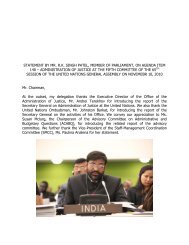
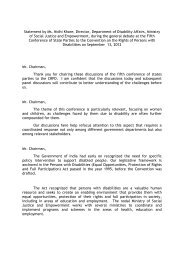
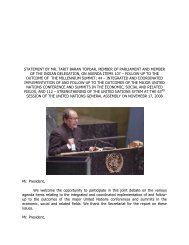
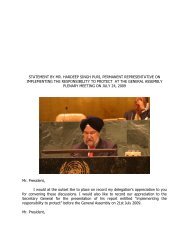
![1 statement by dr.[mrs] kakoli ghosh dastidar - Member States Portal](https://img.yumpu.com/27526598/1/190x245/1-statement-by-drmrs-kakoli-ghosh-dastidar-member-states-portal.jpg?quality=85)
